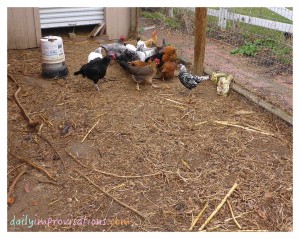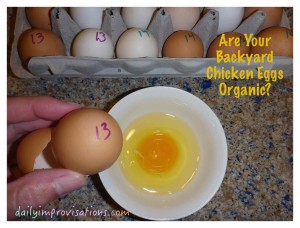
The meaning of the word organic is a bit slippery in popular culture. It is a spin-off of the more exact definitions from biology and chemistry, but sometimes vague and even contradictory. In the scientific realm, something is called organic if it has carbon atoms in it or if it has to do with life processes. From this point of view, chicken eggs of any sort are inarguably organic. There are some foxes and skunks in my neighborhood that completely agree that my chickens are suitably organic.
However, near the bottom of the list in my dictionary comes the blurrier definition for organic of “grown only with animal or vegetable fertilizers.” The examples of such fertilizers include manure and compost. Based on this definition, neither chickens nor eggs are up for consideration of being organic, since this obviously has to do with growing plants. It could be extrapolated, I suppose, to mean that organic chickens are only fed animal or vegetable matter, but with backyard chickens this is unlikely because they instinctively eat pebbles and grit. They need such coarse inorganic matter to help digest their food. Some of it may dissolve to varying degrees in the digestive enzymes of the chicken, since not all gritty substances are hard as rock. Still, this is not necessarily bad, since chickens do need certain minerals in their diets. (Click here to read some helpful hints about raising chickens.)
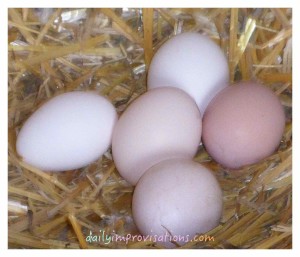
Besides that, observation leads me to believe that while instinct generally serves them well, chickens will eat various bits of trash that blow into their pen. They will also eat unexpected things, like the yarn pieces of an outdoor carpet hung as a temporary door to their coop… something you don’t always anticipate or notice right away. For the record, not a single egg we consumed during this time period looked or tasted like polyester or nylon.
Many people assume that labeling something as organic also means no chemicals have been used anywhere in the chain of events leading to the final product. This is usually referring to substances used as herbicides or pesticides, something the dictionary definition of organic does not mention at all. Defining the word chemical becomes a whole other quandary.
Organic substances, however you define them, have chemical natures and react with other substances around them based on their chemical traits. This is why they can do what they do for plants on a molecular level. Some substances can be both found in nature and be exactly produced in a laboratory, muddying the discussion of what is a synthetic chemical. One could even ask if any so-called synthetic chemicals are unnatural since they are all made from the building blocks called atoms, which are like grown-up legos found in the world around us.
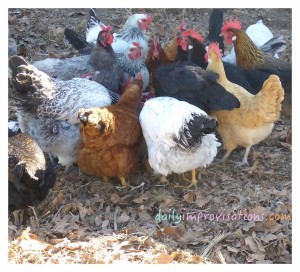
There is no clear point of human manipulation or processing when something becomes unnatural. Almost everyone agrees that some amount of human care and interference in the processes of growing plants or chickens is beneficial, but how much is best, can be very dependent on individual circumstances and other variables affecting the outcome. Even the most dedicated self-described organic gardeners stimulate chemical processes to obtain better compost or even some aspiring natural chicken farmers will provide farmed food and pest control for their chickens.
The legal restrictions for claiming organic status may be in the back of people’s minds. These are laws and regulations decided upon by government entities, which are both subject to fairly regular change and allow for many chemicals that are frowned upon by the stricter organic gardener. Fortunately, none of this matters unless the goal is government certification for legal recognition in the marketplace. The rest of us are free to call our methods organic or not, based on our own understanding of the concept.
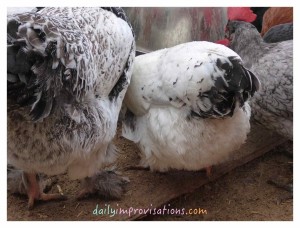
Maybe the better question is whether or not your backyard chickens are healthy, because if they are, your eggs will be healthy. Chances are, your chickens get more space and fresh air than any at a governmentally recognized organic egg farm. Your chickens’ diet is probably more varied, because not only do they get to scratch freely around their open-air pen, but they get diverse scraps from your kitchen and garden.
It is unlikely you can verify every environmental factor affecting your purchased chicken feed. Quite possibly, the farmer can’t even do that, for the wind blows and the rain falls where it will. Similarly, your neighbors may use substances near you that would disqualify you for any legal designation of organic. Even you may decide to use synthetic or processed substances to combat chicken diseases or fight off pests. Despite all of these things, a backyard chicken egg is a tasty, healthy treat, regardless of whether or not everyone agrees on its exact organic status.
